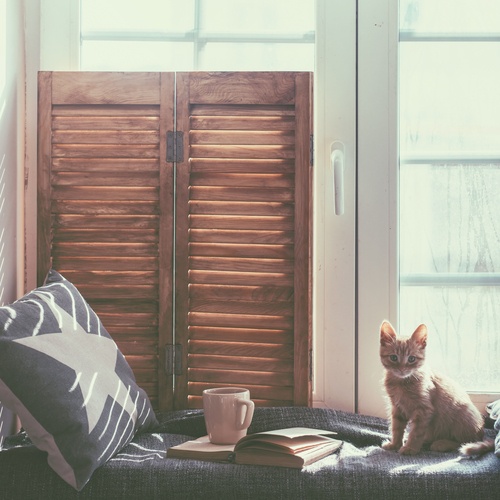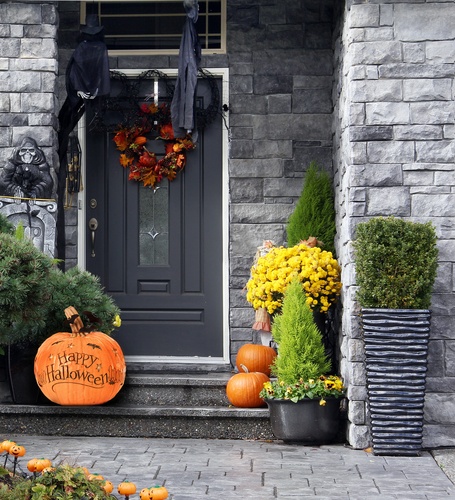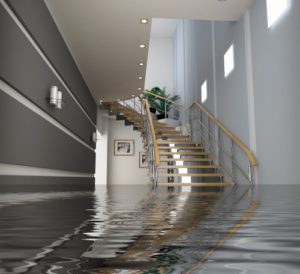Creating Secret Spaces in Your Home

Since October is the month dedicated to all things mystical, it may have you yearning to add a little magic to your home. Or maybe you just want to create a space that’s quiet and away from activity. Whatever your reasons, creating a secret space in your home can be fun and easy. Here are a few creative ways to add them to your living space.
The secret space behind the bookcase
If you’ve ever seen the movie Young Frankenstein, then you know how bookcases can be great at hiding rooms and passages. There’s no reason you can’t add that kind of mysterious element to your own home. It might take an architect to help you design and install your secret bookcase, but think what fun that will be. You can also achieve this look with far less effort and cost by simply covering a wall that has a door with a bookcase wall decal. So go ahead and turn that bedroom closet or bathroom into the secret room you always wished you had!
The playroom under the stairs
What kid wouldn’t want his or her own secret playroom? While many people often dedicate a spare bedroom or a section of the basement to their children’s toys and games, it can be even more fun to find a secret spot for them. What are you doing with that space under the stairs? In many homes, these dead spaces are used for extra storage, if they’re used at all. Why not turn it into a playroom for the kids? Think of all the fun they’ll have pretending to be Harry Potter.
The cozy reading nook
Have you longed for a quiet and private space at home to do some reading? Why not create one for yourself? One of the perfect places for creating a cozy reading nook is under a dormer window or in a bay window. Create a comfortable platform with cushions, add lots of throw pillows, and install a good light for reading. Hang some curtains so the seating area is hidden when they’re closed. Think of all those beautiful late-fall Saturday afternoons you can spend cuddled up with a good book and a cup of hot cocoa.
The magical mini-bar
Sure, closets are great for storing out-of-season clothes, your kids’ sports equipment, and extra sheets and towels. But why not turn your closet into something a little more magical? Closets are great spaces in which to create mini-bars. Line the closet with shelves, and if possible, add a sink and a small fridge to keep wine, champagne, and mixers cold. When the doors are closed, it looks like any old closet. But when it’s time to entertain, you can open the doors and have a gorgeous and practical focal point for your parties.
So there you have it! You can create fun and magical secret spaces in your home without much fuss or extra expense. All it takes is a little imagination in order to create an enchanting space your friends and family will love.
Compliments of Virtual Results






 Do you feel a little overwhelmed by the number of chores you have to do around the house every week? From cleaning the bathroom to washing the sheets, it seems there’s a never-ending list of cleaning tasks that must performed. But the good news is that there are quite a few chores that only need to be completed annually. Here’s the rundown on the things you only need to think about once a year. Hopefully, it will make all the other chores seem more manageable.
Do you feel a little overwhelmed by the number of chores you have to do around the house every week? From cleaning the bathroom to washing the sheets, it seems there’s a never-ending list of cleaning tasks that must performed. But the good news is that there are quite a few chores that only need to be completed annually. Here’s the rundown on the things you only need to think about once a year. Hopefully, it will make all the other chores seem more manageable.
 With all the images in the news of flooding due to Hurricane Florence, you may be wondering what to do if you have a similar emergency. Natural disasters like storms aren’t the only things that can cause your home to flood. You could experience a burst pipe or other water system malfunction that can cause
With all the images in the news of flooding due to Hurricane Florence, you may be wondering what to do if you have a similar emergency. Natural disasters like storms aren’t the only things that can cause your home to flood. You could experience a burst pipe or other water system malfunction that can cause 
 Fall is officially here, which means there’s no time to waste in getting your home ready for the season. This is a great time of year to finish those bigger projects you’ve been meaning to get to as well as regular maintenance chores before colder weather sets in. Here are the top items that should be on your list this fall so you’ll be ready when winter rolls around.
Fall is officially here, which means there’s no time to waste in getting your home ready for the season. This is a great time of year to finish those bigger projects you’ve been meaning to get to as well as regular maintenance chores before colder weather sets in. Here are the top items that should be on your list this fall so you’ll be ready when winter rolls around.



 Catch Our Feed
Catch Our Feed Subscribe via Email
Subscribe via Email Follow Our Tweets
Follow Our Tweets Friend Us On Facebook
Friend Us On Facebook Watch Us On Youtube
Watch Us On Youtube